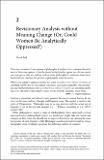Files in this item
Revisionary analysis without meaning change (or, could women be analytically oppressed?)
Item metadata
| dc.contributor.author | Ball, Derek Nelson | |
| dc.contributor.editor | Burgess, Alexis | |
| dc.contributor.editor | Cappelen, Herman | |
| dc.contributor.editor | Plunkett, David | |
| dc.date.accessioned | 2020-03-25T12:30:01Z | |
| dc.date.available | 2020-03-25T12:30:01Z | |
| dc.date.issued | 2020-01-23 | |
| dc.identifier | 247730331 | |
| dc.identifier | f5fa2b81-b9ed-48ef-9ad1-604dfbe26748 | |
| dc.identifier.citation | Ball , D N 2020 , Revisionary analysis without meaning change (or, could women be analytically oppressed?) . in A Burgess , H Cappelen & D Plunkett (eds) , Conceptual Engineering and Conceptual Ethics . Oxford University Press , Oxford , pp. 36-58 . https://doi.org/10.1093/oso/9780198801856.003.0002 | en |
| dc.identifier.isbn | 9780198801856 | |
| dc.identifier.isbn | 9780191840418 | |
| dc.identifier.other | ORCID: /0000-0002-7229-3282/work/71221151 | |
| dc.identifier.uri | https://hdl.handle.net/10023/19706 | |
| dc.description.abstract | This chapter develops a conception of philosophical analysis which makes sense of the idea that a correct analysis can be revisionary (in that it departs from ordinary or expert belief and linguistic usage). The view is superior to the alternatives defended by most proponents of ‘conceptual ethics’ and ‘conceptual engineering’ (according to which revisionary theorizing involves replacing words or concepts) because it better explains the arguments we advance when we engage with proposed revisionary analyses. A key idea is that analytic claims can emerge in the course of debate without change of meaning, so that our acceptance (perhaps late in the debate) of some analyticity can fix the meaning of a word as we used it all along. The discussion focuses on Haslanger’s revisionary analysis of gender. | |
| dc.format.extent | 158691 | |
| dc.language.iso | eng | |
| dc.publisher | Oxford University Press | |
| dc.relation.ispartof | Conceptual Engineering and Conceptual Ethics | en |
| dc.subject | Analysis | en |
| dc.subject | Revisionary theorizing | en |
| dc.subject | Metalinguistic negotiation | en |
| dc.subject | Definition | en |
| dc.subject | Temporal externalism | en |
| dc.subject | Metasemantics | en |
| dc.subject | Analyticity | en |
| dc.subject | BJ Ethics | en |
| dc.subject | BDC | en |
| dc.subject | R2C | en |
| dc.subject.lcc | BJ | en |
| dc.title | Revisionary analysis without meaning change (or, could women be analytically oppressed?) | en |
| dc.type | Book item | en |
| dc.contributor.institution | University of St Andrews. Philosophy | en |
| dc.contributor.institution | University of St Andrews. Arché Philosophical Research Centre for Logic, Language, Metaphysics and Epistemology | en |
| dc.identifier.doi | 10.1093/oso/9780198801856.003.0002 | |
| dc.identifier.url | https://global.oup.com/academic/product/9780198801856 | en |
This item appears in the following Collection(s)
Items in the St Andrews Research Repository are protected by copyright, with all rights reserved, unless otherwise indicated.

